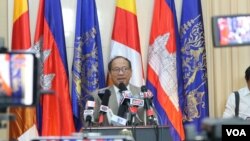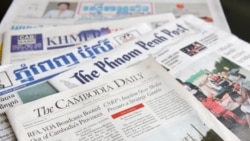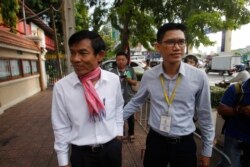Press freedom in Cambodia, in decline since the 2017 crackdown on independent reporting, has taken a turn for the worse, with an increase in arrests and harassment of media outlets during the COVID-19 pandemic.
Reporters Without Borders ranked Cambodia 144th out of 180 countries in its 2020 press freedom index, citing Prime Minister Hun Sen's enhanced "system for cracking down on dissent.”
But top officials in Phnom Penh paint a different picture.
“Cambodia has taken a big step toward what we call a ‘free press regime’ in the context of an open and democratic nation, where we need journalists who have freedom,” said Phay Siphan, Cambodia's top government spokesperson.
“But at the same time, journalists need to be responsible for what they speak and write,” he warned in a recent interview with VOA's Khmer service.
“Whatever you want to report, do it,” he said. “But it must be within a basis of truth, neither terrifying nor creating misunderstanding that leads to an uprising.”
Asked about reporting on sensitive topics, such as state corruption and illegal logging, he said, “I observe that journalists, if they are professional, can report on that because there is no reason [not to do that],” he said, adding a caveat.
“At the same time, we urge [journalists] to respect the dignity of privacy, to avoid [violating] privacy,” he said. “For example, if your reporting involves mentioning exact names and displaying exact portrait photographs of the person, such that they cannot defend their reputation,” then that would violate Phnom Penh's official definition of "professional" journalism.
Why?
“Because journalists are not judges.”
International condemnation
Local journalists and media organizations say the government's assault on free and independent media is ongoing.
“Threats to press freedom, intimidation and harassment against journalists, including lawsuits, [criminal] charges and arrests, remain as reflected in the RSF report,” said Nop Vy, the outgoing media director of Cambodian Center for Independent Media.
The center is one of the few remaining independent media organizations still operating in the country.
“The media have not been pluralistic, with mostly one-sided reporting,” said Vy, who now leads a new Cambodian Journalists Alliance, established to promote and protect press freedom and journalists working in Cambodia.
Despite constitutional guarantees of press freedom, the media are tightly controlled by the ruling Cambodian People’s Party (CPP) and its allies.
Tightening restrictions
As the CPP sought to consolidate its power ahead of the 2017 local and 2018 national elections, there was a rise in independent journalists and political and civic activists being charged, threatened or attacked.
Radio Free Asia (RFA), one of VOA’s sister broadcast outlets funded by the U.S. Congress, closed its Phnom Penh bureau in September 2017, citing “unprecedented” government intimidation of the media. By the end of 2017, Cambodia’s government had closed more than two dozen local radio stations, some of which had rebroadcast VOA and RFA programming.
The Cambodia Daily, an award-winning English-language newspaper that had helped train journalists and strengthen the country’s fragile democracy for over 20 years, was also forced to close.
Two of its former reporters, one of whom is now a VOA contributor, were charged with incitement, and two former RFA reporters are on trial for espionage — charges the journalists and some media observers have said are an attempt to silence them.
More recently, authorities have detained journalists and revoked outlets’ licenses.
“The latest crackdown on the media, especially the revocation of some media licenses, is part of the clampdown on the practicing of journalistic roles of the media that do not have any tendency to broadcast only the government’s activities,” said Vy.
Authorities on April 7 arrested Sovann Rithy, director of the news site TVFB, for quoting the prime minister in a Facebook post.
'More than absurd'
“Imprisoning a journalist for quoting a statement by the prime minister word for word is more than absurd,” Daniel Bastard, head of the RSF’s Asia-Pacific desk, said in a statement.
The Information Ministry also ordered the revocation of TVFB’s media license following his arrest, saying the editor had “selected” the prime minister’s quote.
On Monday, the ministry revoked the license of another news site, CKV TV Online, saying news reporting by the owner of the outlet was in “severe violation of journalism that affects public order.”
CKV TV, which received two ministerial warnings prior to cancellation, had also been subject to similar complaints by citizens and local journalists.
Yeang Sothearin, who was arrested along with former RFA colleague Uon Chhin, said their case was pending.
“Even though we can now live with our families, we have no freedom as anybody else does,” Sothearin told VOA Khmer.
He has become more cautious since his arrest, especially when posting to social media, in case “those ideas could be deemed affecting the government or any governmental agencies.”
“Sometimes, because of those concerns, I am refraining from expressing my opinions on social media," said Sothearin, who is now working on a short-term project with a local organization. "This is one form of my self-restriction.”
Questioning 'professionalism'
Information Ministry spokesperson Ouk Kimseng denies that the government has restricted press freedom or harassed journalists.
“[RSF] has never seen anything positive in press freedom or freedom of expression the government has provided so far in Cambodia,” he told VOA, adding that de-licensing measures were justified.
“Those [reporters] did not follow the [professional] journalistic roles and responsibilities,” he said. He declined to comment on the earlier arrests of the RFA and Daily reporters, saying the cases were in the hands of the courts.
Echoing the government view that Cambodia has greater press freedom than at any other time, Pen Bona, top editor of PNN TV — owned by business tycoon and ruling CPP party Senator Ly Yong Phat — said authorities need a better grasp of journalistic roles and responsibilities.
“In some cases, authorities have taken too strong measures, like the arrests and lawsuits [against journalists],” said Bona, adding that both journalists and state officials should try harder to understand each other.
A veteran journalist and president of the independent Club of Cambodian Journalists, which is widely viewed as a government-aligned organization, Bona also said some journalists aren’t actual professionals, but just “self-proclaimed journalists” who “practice the profession incorrectly.”
“So, it’s both ways,” he said.









